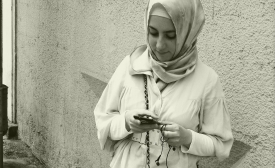isis
The State Department actually has a Twitter account focused on countering some of these jihadis and extremists online and specifically on Twitter. It’s hard to say how effective that is, perhaps it’s better than doing nothing. But we shouldn’t kind of delude ourselves into thinking that public diplomacy can really change people’s minds in a very obvious way. The American government doesn’t have a lot of credibility with anyone who is going to be vaguely sympathetic to the aims of th
In a polarized region and a complicated world, the Islamic State in Iraq and Syria presents a unifying threat to a broad array of countries, including the United States. What’s needed to confront its nihilistic vision and genocidal agenda is a global coalition using political, humanitarian, economic, law enforcement and intelligence tools to support military force.

Social media and digital diplomacy have dominated the week in PD.
In the past week or so, major social media events have included a funeral, a police shooting, and a beheading. I don't mean to suggest that the ceremony for Mike Brown in Ferguson, the shooting of Kajieme Powell a few miles away, or the Islamic State's beheading of James Foley in Syria were primarily social media events. They are all tragedies, which have taken and shattered lives.

Philip Seib encourages public diplomats to read the comments section.
Why? Because it’s becoming pretty obvious that Isis’s most effective weapon is the smartphone. The group has been using Twitter, Facebook and YouTube to great effect, to create a digital broth that has both panicked and fascinated us. Their graphic videos make front page news and their deranged tweets sway international diplomacy. Social media strategists round the world must be watching in awe.
Qatar is working to help free four Americans held hostage in Syria by various armed groups, a Gulf source familiar with the matter said on Monday, a day after the Gulf Arab state's diplomacy helped free a journalist held since 2012.
There are extraordinary elements in the present U.S. policy in Iraq and Syria that are attracting surprisingly little attention. In Iraq, the U.S. is carrying out air strikes and sending in advisers and trainers to help beat back the advance of the Islamic State of Iraq and the Levant (better known as ISIS) on the Kurdish capital, Erbil. The U.S. would presumably do the same if ISIS surrounds or attacks Baghdad. But in Syria, Washington’s policy is the exact opposite: there the main opponent of ISIS is the Syrian government and the Syrian Kurds in their northern enclaves.







